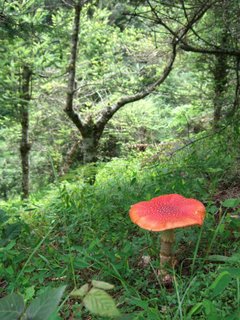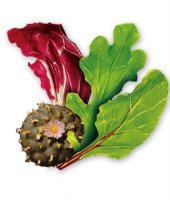
Thursday, March 15, 2007
The Daily Hump: Sooth
The ides of March, a date that will live in infamy (at least for members of the gens Julia). For it's on this day that Gaius Julius Caesar, from the Caesarian section of Rome, was slain by a gaggle of senators which included among them supposed bff Brutus. Of course, Caesar got a pretty good heads up from one Titus Vestricius Spurinna whose name may not be well known but job title surely is: soothsayer. Alas, Titus's warnings were not heeded and the world took receipt of one very dead emperor 2,051 years ago today.
Sooth comes from the Old English soð meaning "truth". Soð is the noun form of the adjective soþ, "true", which was originally *sonþ- and from the Proto-Germanic *santhaz (not to be confused with the Proto-Germanic sexual practice known as dirty *santhaz), a cognate with Old English synn "sin" and Latin sontis "guilty". Ultimately, we go back to the Proto-Indo-European *es-ont meaning "being, existence". This also is the root of today's s-forms of the verb "to be" such as the Latin sunt, German sind and French sont.
Sooth is also a linguistic cousin of soothe, which came from the Old English soðian "show to be true". How this came to mean "to quiet, mollify" beats me. Any ideas?
sooth [Online Etymology Dictionary]
soothe [Online Etymology Dictionary]
Ides of March [Wikipedia]
Julius Caesar [Wikipedia]
Titus Vestricius Spurinna [Wikipedia]
Sooth comes from the Old English soð meaning "truth". Soð is the noun form of the adjective soþ, "true", which was originally *sonþ- and from the Proto-Germanic *santhaz (not to be confused with the Proto-Germanic sexual practice known as dirty *santhaz), a cognate with Old English synn "sin" and Latin sontis "guilty". Ultimately, we go back to the Proto-Indo-European *es-ont meaning "being, existence". This also is the root of today's s-forms of the verb "to be" such as the Latin sunt, German sind and French sont.
Sooth is also a linguistic cousin of soothe, which came from the Old English soðian "show to be true". How this came to mean "to quiet, mollify" beats me. Any ideas?
sooth [Online Etymology Dictionary]
soothe [Online Etymology Dictionary]
Ides of March [Wikipedia]
Julius Caesar [Wikipedia]
Titus Vestricius Spurinna [Wikipedia]
Labels: French, German, Latin, Old English, PIE, Proto-Germanic, The Daily Hump
Monday, March 05, 2007
TWiEL: Texas German
This Week in Endangered Languages: Texas German
Language family: Indo-European, Germanic, West Germanic, High German, German (dialect)
Writing system: Latin alphabet
Where you'll hear it: Texas Hill Country
The origins: "Texas German is a dialect of the German language that is spoken by descendants of German immigrants who settled in the Texas Hill Country region in the mid-19th century. These immigrants founded the towns of New Braunfels, Fredericksburg, Boerne, Sisterdale, Schulenburg, Weimar, and Comfort. German immigrants began arriving over a period of two years, quickly raising the population of the town to over 1,000."
The beginning of the end: "Most German Texans continued to speak German in their homes and communities, but were required to learn English when Texas education rules mandated English-only instruction during and after World War I. Due to the growth of these communities and cultural bias during World War I and World War II, Texas German speakers drifted towards English, and few passed the language to their descendants. The dialect is near extinction, as it is now only spoken by a few elderly people."
Language family: Indo-European, Germanic, West Germanic, High German, German (dialect)
Writing system: Latin alphabet
Where you'll hear it: Texas Hill Country
The origins: "Texas German is a dialect of the German language that is spoken by descendants of German immigrants who settled in the Texas Hill Country region in the mid-19th century. These immigrants founded the towns of New Braunfels, Fredericksburg, Boerne, Sisterdale, Schulenburg, Weimar, and Comfort. German immigrants began arriving over a period of two years, quickly raising the population of the town to over 1,000."
The beginning of the end: "Most German Texans continued to speak German in their homes and communities, but were required to learn English when Texas education rules mandated English-only instruction during and after World War I. Due to the growth of these communities and cultural bias during World War I and World War II, Texas German speakers drifted towards English, and few passed the language to their descendants. The dialect is near extinction, as it is now only spoken by a few elderly people."
Labels: German, Germanic, High German, Indo-European, Texas German, TWiEL, West Germanic
Tuesday, February 13, 2007
The Daily Hump: (Sea) Hag
 As the title of this post suggests my particular interest in hags is with the sea variety. Anyone who has ever watched a Popeye cartoon is familiar with the Sea Hag; she's the tall witchy woman with a vulture for a familiar who suffers an unrequited crush on the our favorite roid-raged sailor. It's kind of pathetic, really. But I experienced no such empathy as a child; I just thought the Sea Hag was creepy and awesome in the way only nautical rapscallions can be (evidence: a, b and c).
As the title of this post suggests my particular interest in hags is with the sea variety. Anyone who has ever watched a Popeye cartoon is familiar with the Sea Hag; she's the tall witchy woman with a vulture for a familiar who suffers an unrequited crush on the our favorite roid-raged sailor. It's kind of pathetic, really. But I experienced no such empathy as a child; I just thought the Sea Hag was creepy and awesome in the way only nautical rapscallions can be (evidence: a, b and c).Hag is a shortened form of the Old English hægtesse meaning "witch, fury." The word can be traced further back to the Proto-Germanic *hagatusjon-. The Middle Dutch cognate, haghetisse, was also shorted to form the German Hexe, meaning "witch;" and it's via the Amish we got our English hex. Now, here's where things get crazy:
[Hag's first] element is probably cognate with [Old English] haga "enclosure" [which is related to our modern hedge]...Or second element may be connected with [Norwegian} tysja "fairy, crippled woman"...from PIE *dhewes- "to fly about, smoke, be scattered, vanish."...Haga is also the haw- in hawthorn, which is a central plant in northern European pagan religion. There may be several layers of folk-etymology here. If the hægtesse was once a powerful supernatural woman..., it may have originally carried the hawthorn sense. Later, when the pagan magic was reduced to local scatterings, it might have had the sense of "hedge-rider," or "she who straddles the hedge," because the hedge was the boundary between the "civilized" world of the village and the wild world beyond. The hægtesse would have a foot in each reality...Sea hag [TV Acres]
hag [Online Etymology Dictionary]
hex [Online Etymology Dictionary]
Häxan [IMDB.com]
The Dreams in the Witch House [Wikipedia]
Labels: German, Middle Dutch, Norwegian, Old English, Pennsylvania Dutch, PIE, Proto-Germanic, The Daily Hump
Monday, February 05, 2007
The Daily Hump: Reindeer
Loyal WH readers undoubtedly noticed there was no post on Friday. This is because I was spending a relaxing vacation up in southern Vermont where the gf and I made a brief excursion to visit some reindeer. Apparently unbeknownst to some people, reindeer are not fictional animals--they're quite real--and quite adorable as this video demonstrates.
Labels: German, Greek, Old English, Old Norse, Proto-Germanic, The Daily Hump
Wednesday, January 10, 2007
The Daily Hump: Cozy
 As warm-blooded mammals human beings seem to have a natural affinity towards snug, comfortable shelters. Perhaps this yearning for coziness is nothing more than a memory heldover from our time in the womb. The word cozy is most likely of Scandinavian origin (cf. the Norwegian kose seg, "be cozy") which is unsurprising given the cold Nordic climate.
As warm-blooded mammals human beings seem to have a natural affinity towards snug, comfortable shelters. Perhaps this yearning for coziness is nothing more than a memory heldover from our time in the womb. The word cozy is most likely of Scandinavian origin (cf. the Norwegian kose seg, "be cozy") which is unsurprising given the cold Nordic climate. English also has a word gemutlich (with or without umlaut) which is from zie Germans and is generally defined as "pleasant and friendly" (possibly first used as an adjective in English by Queen Victoria). In German a gemütlich person or place is one that obeys the philosphy of Gemütlichkeit, which goes beyond the English concept of coziness in its level of abstractness:
...rather than basically just describing a place as not too large, well-heated and nicely furnished (a cosy room, a cosy flat), Gemütlichkeit connotes, much more than cosiness, the notion of belonging, social acceptance, cheerfulness, the absence of anything hectic and the spending of quality time in a place as described above...A gemütlich person...is one that takes part in this lifestyle and knows about the tensions he/she is able to cause, and thus tries to avoid these things actively.This idea of avoiding tension in one's enviroment suggests a similarity to Chinese feng shui, although I'd argue the Taoist-inspired art would likely be focused much more on passive rather than active avoidance. This being said, we do see fairly analagous ideas to Gemütlichkeit in other parts of northern Europe including the Dutch gezelligheid, the Danish hygge and the Russian уют.
From an anthropological perspective it'd be interesting to examine whether cultures from warmer climates maintain any sort of concept of cozy.
cozy [Online Etymology Dictionary]
cozy [OED]
gemütlich [OED]
Gemütlichkeit [Wikipedia]
Gezelligheid [Wikipedia]
Labels: Chinese, Danish, Dutch, German, Norwegian, Old Norse, Russian, The Daily Hump
Tuesday, January 09, 2007
Mercaptan! Mercaptan!
 So, Charles Sturcken, a spokesman for the New York City Department of Environmental Protection, said that the mysterious odor that hovered over Manhattan yesterday wafted over from New Jersey's industrialized waterfront (shocking). I've read a few reports that theorize the smell originated in the Meadowland swamps (I'm imagining a huge burp erupting from beneath Giants Stadium which causes among other things the exhumation of Jimmy Hoffa's remains). According to 1010Wins.com
So, Charles Sturcken, a spokesman for the New York City Department of Environmental Protection, said that the mysterious odor that hovered over Manhattan yesterday wafted over from New Jersey's industrialized waterfront (shocking). I've read a few reports that theorize the smell originated in the Meadowland swamps (I'm imagining a huge burp erupting from beneath Giants Stadium which causes among other things the exhumation of Jimmy Hoffa's remains). According to 1010Wins.com Sturcken said that the odor could have been caused by mercaptan, the chemical added to normally odorless natural gas to make it easily detectable, but he added, "Nothing has been confirmed."
 Mercaptan, C2H5SH, also called thiol, comes to us from Medieval Latin via Danish and then German. The Medieval Latin mercurium captāns literally means "seizing mercury" because of the -SH group's ability to bind tightly with the element mercury, which was of great importance to the early alchemists.
Mercaptan, C2H5SH, also called thiol, comes to us from Medieval Latin via Danish and then German. The Medieval Latin mercurium captāns literally means "seizing mercury" because of the -SH group's ability to bind tightly with the element mercury, which was of great importance to the early alchemists.And if yesterday's smell was familiar, get this: the notorious asparagus pee effect is caused from the breakdown of mercaptan. According to Take Our Word For It
Mercaptans are found in onions, skunks, rotten eggs, and farts! And, of course, asparagus. One source says that humans can detect the odor of mercaptans at 0.02 parts per billion. If correct that is quite astounding.It looks like Take Our Word For It forgot to include one thing in its list of places where we find mercaptan: New Jersey.
Thiol [Wikipedia]
Mercaptan [AHD]
Labels: Danish, German, Medieval Latin
Friday, December 01, 2006
Hump This: Pimp My Etymology
Hump This is a (quasi-)weekly Friday feature where you, the WordHumper reader, choose which lucky word gets humped back to the stoneage (or at least to Proto-Indo-Europa). Today's word comes from RM in California who asks:
 1) It's been suggested that pimp has a connection with the German Pimpf meaning "small boy" but the German word appears much later than the English pimp (c. 1600) and thus any causal relationship seems unlikely. Plus, there are apparently a number of semantic differences.
1) It's been suggested that pimp has a connection with the German Pimpf meaning "small boy" but the German word appears much later than the English pimp (c. 1600) and thus any causal relationship seems unlikely. Plus, there are apparently a number of semantic differences.
2) The second suggestion, which is what I would have guessed, is that pimp is short for pimpernel, scarlet-colored or otherwise. But again, the OED claims there are semantic irregularities.
3) There are a number of possible French roots including pimpant (seductive in appearance), pimper (to adorn) and pimpernol, which is a small eel (and is surprisingly not etymologically related to pimpernel at all). The OED dismisses any connections to these words as merely coincidental.
However, the Online Etymology Dictionary, citing a mysterious source "Weekley", offers this li'l nugget of linguistic gold:
If you have a word you'd like humped please email it, along with your location, to wordhumper.
Where does the word "pimp" come from?The American Heritage Dictionary sometimes disappoints me. Effort counts for something in life and sometimes the AHD just doesn't try very hard. Case in point, its entry for the word pimp: "Origin Unknown". Now, the OED also says pimp's origin is unknown however it lists a myriad of possibilities then strikes them down one-by-one. I appreciate this. Let's take a look at what the OED has to say:
 1) It's been suggested that pimp has a connection with the German Pimpf meaning "small boy" but the German word appears much later than the English pimp (c. 1600) and thus any causal relationship seems unlikely. Plus, there are apparently a number of semantic differences.
1) It's been suggested that pimp has a connection with the German Pimpf meaning "small boy" but the German word appears much later than the English pimp (c. 1600) and thus any causal relationship seems unlikely. Plus, there are apparently a number of semantic differences.2) The second suggestion, which is what I would have guessed, is that pimp is short for pimpernel, scarlet-colored or otherwise. But again, the OED claims there are semantic irregularities.
3) There are a number of possible French roots including pimpant (seductive in appearance), pimper (to adorn) and pimpernol, which is a small eel (and is surprisingly not etymologically related to pimpernel at all). The OED dismisses any connections to these words as merely coincidental.
However, the Online Etymology Dictionary, citing a mysterious source "Weekley", offers this li'l nugget of linguistic gold:
Weekley suggests [Middle French] pimpreneau, defined in Cotgrave [?] (1611) as "a knave, rascall, varlet, scoundrell."So, there you go. Now where's my money, bitch?
If you have a word you'd like humped please email it, along with your location, to wordhumper.
Friday, October 20, 2006
The Daily Hump: Mushrooms and Toadstools
 There's so much to say about mushrooms and toadstools from a historical and cultural perspective that I wouldn't know where to begin nor is WordHumper the forum to explore the intricacies of my favorite fungi. The best I can do is suggest you read Elio Schaecter's excellent In The Company of Mushrooms*. As for me, I'll be limiting this discourse to purely an etymological examination.
There's so much to say about mushrooms and toadstools from a historical and cultural perspective that I wouldn't know where to begin nor is WordHumper the forum to explore the intricacies of my favorite fungi. The best I can do is suggest you read Elio Schaecter's excellent In The Company of Mushrooms*. As for me, I'll be limiting this discourse to purely an etymological examination.Mushroom comes to us from the Medieval Latin musariō, musariōn- via Old French, Anglo-Norman then finally Middle English. Per the Online Etymology Dictionary:
Barnhart says [mushroom is] "of uncertain origin." Klein calls it "a word of pre-Latin origin, used in the North of France;" OED says it usually is held to be a derivative of Fr. mousse "moss," and Weekley agrees, saying it is properly "applied to variety which grows in moss."Don't worry, I don't know who Banhart, Klein or Weekley are either.
Toadstool is one of my favorite words in the English language. The OED and many other dictionaries explain the word as "fanciful"; a compound of toad + stool that was first coined in Middle English. Toads were regarded as extremely poisonous and toadstools generally only refer to inedible or poisonous mushrooms. In my readings I also happened upon an alternate etmology which suggests that toadstool had nothing to do with toads but rather the German tod, death. As Wikipedia states:

The term [toadstool] dates from the fourteenth century and is a fanciful [there is that word again!] name combining toad, which were associated with poison, and stool, which is an archaic term for the head of a mushroom. Another explanation comes from the German translation of tod-stuhl, literally, "death-chair," referring to the shape of the fruiting body and also to the slow, agonizing death from mushroom poisoning for those who eat it.Regardless of which etymology is correct, toadstools are named for their toxicity. Given the association of toads with poison I investigated whether the English toad could be related to the German tod; alas, the OED claims that although toad can be traced as far back as to the Old English tādige it has no cognates in other languages and is thus considered of unknown origin.**
In conclusion, next time you're shrooming with the hippies, smelling a stinky phallus, hanging out with the hobbits, Smurfs, mycologists, or Brothers Mario, or just eating a slice of pizza stop and think about what a lousy and boring world we'd live in without the ubiquitous mushroom.***
*Completely unrelated, I also suggest you read Spy: The Funny Years.
 **It should be noted that Princess Toadstool is the best character available in Super Mario Bros 2 (photo: SMB1). Obviously, I'm not the only person who wondered why Mario would be romantically involved with someone whose last name is based upon a fungus responsible for "slow, agonizing death"; in late 1996 Nintendo changed her name to Peach. So gay.
**It should be noted that Princess Toadstool is the best character available in Super Mario Bros 2 (photo: SMB1). Obviously, I'm not the only person who wondered why Mario would be romantically involved with someone whose last name is based upon a fungus responsible for "slow, agonizing death"; in late 1996 Nintendo changed her name to Peach. So gay.***I'll be out of the country for a few days so the next hump will be on Wednesday.
Labels: Anglo-Norman, German, Medieval Latin, Middle English, Old English, Old French, The Daily Hump
Thursday, August 24, 2006
The Daily Hump: Tripping on Salad
 I was waiting in line at the salad bar yesterday when a very conservatively dressed woman in front of me ordered the "mescaline greens." It was obvious what she meant as she was pointing to the mesclun. That got me thinking; do mescaline and mesclun share a common etymology? Upon returning to the office I began my research. Mesclun is related to the Provençal mesclom, mesclumo meaning mixture. These words harken back to the Latin verb misculāre, to mix thoroughly. Interestingly, the word meddle also stems from the Latin misculāre. Thus, meddle and mesclun are sort of linguistic cousins.
I was waiting in line at the salad bar yesterday when a very conservatively dressed woman in front of me ordered the "mescaline greens." It was obvious what she meant as she was pointing to the mesclun. That got me thinking; do mescaline and mesclun share a common etymology? Upon returning to the office I began my research. Mesclun is related to the Provençal mesclom, mesclumo meaning mixture. These words harken back to the Latin verb misculāre, to mix thoroughly. Interestingly, the word meddle also stems from the Latin misculāre. Thus, meddle and mesclun are sort of linguistic cousins. But I'm getting off topic; what about mescaline? Mescaline has been used for centuries in Native American religious ceremonies, most notably by the Huichols of Mexico and The Doors of LA. The actual chemical that causes the notorious hallucinations was first extracted in 1897 by a German, Arthur Heffter. Thus, not surprisingly, the word mescaline has both American Spanish (mescal) and German (-in) roots. The root, mescal, made it into English on its own as an accepted name for the peyote button that contains the chemical mescaline. It is also a synonym for maguey, which is any of various American plants of the genus Agave, especially the century plant. Finally, mescal can also be the liquor or food created by preparing certain agaves. And, we find, mescal's etymology is rooted in this liquor and food sense: American Spanish, from Nahuatl mexcalli, mescal liquor : metl, maguey plant + perhaps ixca, xca, to bake.
But I'm getting off topic; what about mescaline? Mescaline has been used for centuries in Native American religious ceremonies, most notably by the Huichols of Mexico and The Doors of LA. The actual chemical that causes the notorious hallucinations was first extracted in 1897 by a German, Arthur Heffter. Thus, not surprisingly, the word mescaline has both American Spanish (mescal) and German (-in) roots. The root, mescal, made it into English on its own as an accepted name for the peyote button that contains the chemical mescaline. It is also a synonym for maguey, which is any of various American plants of the genus Agave, especially the century plant. Finally, mescal can also be the liquor or food created by preparing certain agaves. And, we find, mescal's etymology is rooted in this liquor and food sense: American Spanish, from Nahuatl mexcalli, mescal liquor : metl, maguey plant + perhaps ixca, xca, to bake.So, there you have it: mesclun and mescaline do not share a common etymology, and although you're unlikely to find mescaline at your salad bar there's nothing that says mescal may not be a tasty addition to your mesclun.
Mescaline [Wikipedia]
Mesclun [The American Heritage® Dictionary of the English Language, Fourth Edition]
Labels: German, Latin, Nahuatl, Spanish, The Daily Hump
Saturday, August 19, 2006
The Daily Hump: Doppelgänger
 dop·pel·gäng·er or dop·pel·gang·er (dŏp'əl-găng'ər, -gĕng'-)
dop·pel·gäng·er or dop·pel·gang·er (dŏp'əl-găng'ər, -gĕng'-)
n. A ghostly double of a living person, especially one that haunts its fleshly counterpart.
[German, a double : doppel, double (from French double; see double) + Gänger, goer (from Gang, a going, from Middle High German ganc, from Old High German).]
[The American Heritage® Dictionary of the English Language, Fourth Edition]
Footnote: I remember first coming upon the word doppelgänger in Konami's 1990 NES release Castlevania III: Dracula's Curse. Great game!
Labels: German, Middle High German, Old High German, The Daily Hump